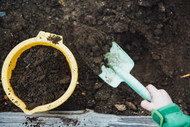Creating your own compost
For the environmentally-conscious gardener in the UK, making your own compost is not only a sustainable practice but also a rewarding journey that transforms kitchen scraps and garden waste into black gold for your plants.
Why Compost?
Composting is nature’s way of recycling. Instead of sending organic waste to landfills where it decomposes anaerobically (without oxygen) and produces harmful greenhouse gases, composting allows us to harness the natural decomposition process to create a nutrient-rich amendment for our gardens. From kitchen scraps like fruit peels and coffee grounds to garden clippings and fallen leaves, almost any organic material can be composted.
Getting Started: Essentials for Composting Success
Choose the Right Bin: While there are various composting methods, such as trench composting and vermicomposting, a simple compost bin or heap works wonders for beginners. Ensure adequate airflow by opting for a bin with ventilation or consider creating a three-bin system for efficient composting.
Layering Ingredients: Alternate layers of green (nitrogen-rich) and brown (carbon-rich) materials to maintain the ideal carbon-to-nitrogen ratio for decomposition. Green materials include vegetable scraps, grass clippings, and coffee grounds, while brown materials comprise dry leaves, cardboard, and newspaper.
Maintain Moisture and Aeration: Like any living ecosystem, compost needs the right balance of moisture and oxygen to thrive. Keep the compost pile damp, and turn it regularly to aerate and distribute microbes evenly.
Patience is Key: Depending on factors like temperature, moisture, and the size of the compost pile, the process can take anywhere from a few months to a year. Embrace the journey and trust in the magic of decomposition.
Composting Dos and Don’ts
- Do Compost: Fruit and vegetable scraps, eggshells, tea bags, coffee grounds, lawn trimmings, shredded paper, and cardboard.
- Don’t Compost: Meat, dairy, oily foods, pet waste, and diseased plants, as these can attract pests or introduce pathogens to the compost pile.
Troubleshooting Common Issues
- Foul Odors: Aerate the compost pile and add more brown materials to balance the moisture.
- Pests: Cover food scraps with a layer of brown material to deter pests, and avoid composting meat or dairy products that attract rodents.
- Slow Decomposition: Ensure the compost pile is moist but not soggy, and chop larger materials into smaller pieces to speed up decomposition.
Harvesting and Using Your Compost
When your compost resembles dark, crumbly soil and has a rich earthy scent, it’s ready to use. Sieve out any large, undecomposed materials, and incorporate the compost into your garden beds or pots to enrich the soil and feed your plants. Alternatively, create compost tea by steeping compost in water to make a nutrient-rich liquid fertilizer for your plants.
In the grand tapestry of gardening, composting stands as a testament to the beauty of sustainability. By diverting organic waste from landfills and harnessing the power of decomposition, we not only nourish our gardens but also contribute to a healthier planet for future generations.

